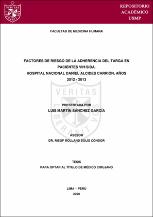Factores de riesgo de la adherencia del targa en pacientes VIH/Sida. Hospital Nacional Daniel Alcides Carrión, años 2012 - 2013

Ver/
Trabajo
(application/pdf: 697.4Kb)
(application/pdf: 697.4Kb)
Fecha
2020Autor(es)
Sánchez García, Luis Martín
Asesor(es)
Solís Cóndor, Risof Rolland
Metadatos
Mostrar el registro completo del ítemResumen
Objective: The main objective of the study was to determine the risk factors for the lack of the adherence of the treatment antiretroviral therapy (HAART) in HIV / AIDS patients treated at the Daniel Alcides Carrión National Hospital (HNDAC) in the city of Callao, In the years 2012 and 2013.
Materials and methods: The study design and type is observational, retrospective. The study group is made up of patients diagnosed with HIV / AIDS who received highly active antiretroviral therapy (HAART) in the years 2012 and 2013. For the collection of data, a registry was created for this purpose. Which filled out the required data with the medical records of each patient. After completing the field work, the data were processed in the SPSS version 25 statistical package to perform the corresponding statistical analysis.
Conclusions: 120 patients were included, of which 43 (35.8%) were cases of nonadherence to treatment. 63 (52.5%) were men and 57 (47.5%) women. The followed schemes were AZT + 3TC + EFV 57 (47.5%), followed by the AZT + 3TC + NVP 40 scheme (33.3%). The main reasons given for the lack of adherence to HAART were forgetfulness of taking medication 16 (72.7%), followed by hourly difficulty 10 (76.9%), and the belief of negative effects 5 (71.4%). The factors associated (<0.05) with this lack of adherence were mainly weight loss (n = 35: 63.6%), followed by age younger than 35 years (n = 32: 57.1%), the level of viral load greater than 400 copies / ml (n = 30, 54.6%) and finally the female sex (n = 30: 52.6%).
Colecciones
- Tesis de pregrado [484]
Editor
Universidad de San Martín de Porres
Tipo de investigación
https://purl.org/pe-repo/renati/type#tesis
Acceso
info:eu-repo/semantics/openAccess
Notas
RESUMEN
Objetivo: El objetivo del estudio fue identificar los factores de riesgo de la falta de adherencia del Tratamiento Antirretroviral de Gran Actividad (TARGA) en pacientes con VIH/SIDA tratados en el Hospital Nacional Daniel Alcides Carrión (HNDAC) de la ciudad del Callao – Perú, durante los años 2012 y 2013.
Materiales y métodos: El diseño del estudio fue observacional transversal de prevalencia, retrospectivo. La población de estudio estuvo conformada por pacientes con diagnóstico de VIH/SIDA y que recibieron tratamiento antirretroviral de gran actividad (TARGA) durante los años 2012 y 2013. Se usó un instrumento de recolección de datos elaborado para este fin con el cual se obtuvo los datos requeridos a partir de las historias clínicas de cada paciente. Los datos fueron ingresados y analizados usando el paquete estadístico SPSS versión 25.
Resultados:
Se incluyó 120 pacientes de los cuales 43 (35.8%) fueron casos de falta de adherencia al tratamiento . 63 (52.5%) fueron hombres y 57 (47.5%) mujeres. Los esquemas seguidos fueron AZT + 3TC + EFV 57 (47.5%), seguido del esquema AZT + 3TC + NVP 40 (33.3%). Las principales razones aducidas para la falta de adherencia al TARGA fueron el olvido de la toma de medicamentos 16 (72.7%), seguido de dificultad horaria 10 (76.9%), y la creencia de efectos negativos 5 (71.4%). Los factores asociados (< 0.05) a esta falta de adherencia fueron principalmente la baja de peso (n=35: 63.6%), seguido por edad menor de 35 años (n=32: 57.1%), el nivel de carga viral mayor a 400 copias/ml (n=30, 54.6%) y finalmente el sexo femenino (n=30: 52.6%).







